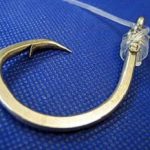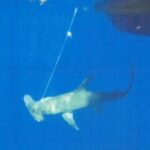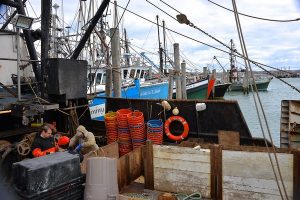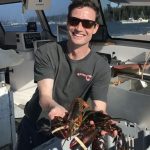Tag Archives: Lenfest Ocean Program
D.B. Pleschner: Study: No correlation between forage fish, predator populations
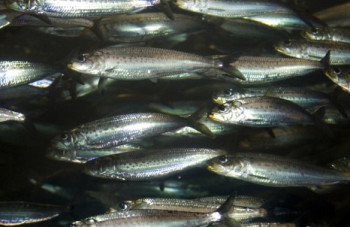 On April 9-10, the Pacific Fishery Management Council is meeting in Sacramento to deliberate on anchovy management and decide on 2017 harvest limits for sardine, two prominent west coast forage fish. Extreme environmental groups like Oceana and Pew have plastered social media with allegations that the anchovy population has crashed, sardines are being overfished and fisheries should be curtailed, despite ample evidence to the contrary. Beyond multiple lines of recent evidence that both sardines and anchovy populations are increasing in the ocean, a new study published this week in the journal Fisheries Research finds that the abundance of these and other forage fish species is driven primarily by environmental cycles with little impact from fishing, and well-managed fisheries have a negligible impact on predators — such as larger fish, sea lions and seabirds. This finding flies directly in the face of previous assumptions prominent in a 2012 study commissioned by the Lenfest Ocean Program, funded by the Pew Charitable Trusts, heirs of Sun Oil Company. The Lenfest study concluded that forage fish are twice as valuable when left in the water to be eaten by predators and recommended slashing forage fishery catch rates by 50 to 80 percent. click here to continue reading the article 20:39
On April 9-10, the Pacific Fishery Management Council is meeting in Sacramento to deliberate on anchovy management and decide on 2017 harvest limits for sardine, two prominent west coast forage fish. Extreme environmental groups like Oceana and Pew have plastered social media with allegations that the anchovy population has crashed, sardines are being overfished and fisheries should be curtailed, despite ample evidence to the contrary. Beyond multiple lines of recent evidence that both sardines and anchovy populations are increasing in the ocean, a new study published this week in the journal Fisheries Research finds that the abundance of these and other forage fish species is driven primarily by environmental cycles with little impact from fishing, and well-managed fisheries have a negligible impact on predators — such as larger fish, sea lions and seabirds. This finding flies directly in the face of previous assumptions prominent in a 2012 study commissioned by the Lenfest Ocean Program, funded by the Pew Charitable Trusts, heirs of Sun Oil Company. The Lenfest study concluded that forage fish are twice as valuable when left in the water to be eaten by predators and recommended slashing forage fishery catch rates by 50 to 80 percent. click here to continue reading the article 20:39
Ray Hilborn study disputes previous findings on forage fish
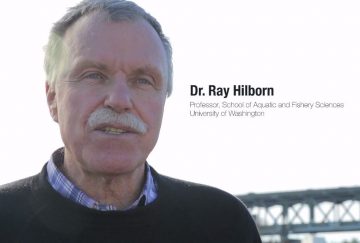 A new study has been published today by a scientific group led by University of Washington fisheries researcher Ray Hilborn that disputes previous findings on the impact of human and natural predation on forage fish such as anchovies, sardines and herring. The study, published in the scientific journal Fisheries Research, found that human fishing for forage fish does not have as great an impact on the food chain as previously thought, given that humans typically catch fish of much larger size than those typically hunted and eaten by non-human species. The study also decouples the link between the size of forage fish populations and the populations of species that predate on forage fish. “What we found is that there is essentially no relationship between how many forage fish there are in the ocean and how well predators do in terms of whether the populations increase or decrease,” Hilborn said in a video explaining the study’s findings. Video, continue reading the story here 11:47
A new study has been published today by a scientific group led by University of Washington fisheries researcher Ray Hilborn that disputes previous findings on the impact of human and natural predation on forage fish such as anchovies, sardines and herring. The study, published in the scientific journal Fisheries Research, found that human fishing for forage fish does not have as great an impact on the food chain as previously thought, given that humans typically catch fish of much larger size than those typically hunted and eaten by non-human species. The study also decouples the link between the size of forage fish populations and the populations of species that predate on forage fish. “What we found is that there is essentially no relationship between how many forage fish there are in the ocean and how well predators do in terms of whether the populations increase or decrease,” Hilborn said in a video explaining the study’s findings. Video, continue reading the story here 11:47
Examining the Impacts of Whales on Commerical Fisheries – Lenfest Ocean Program

At the International Whaling Commission (IWC), a principle argument used by some pro-whaling countries to resume whaling has been that whales eat large amounts of fish and thus compete with humans for commercial fish catches. This project examines the scientific evidence for the assertion that commercial fisheries are negatively impacted by whales’ consumption of fish, focusing on the Caribbean and northwest Africa because we know whales eat at McDonalds! more@lenfestocean.org 16:42

































